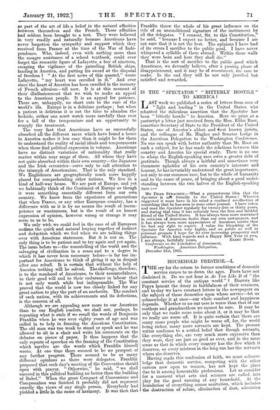IS THE " SPECTATOR " " BITTERLY HOSTILE " TO
AMERICA ?
AST week we published a series of letters from men of " light and leading " in the United States, who rebutted the ridiculous assertion that the Spectator has been " bitterly hostile " to America. Here we print as a postscript a letter just received from the Hon. Ehhu Root, sometime Secretary of State to the President of the United States, one of America's ablest and *best known jurists, and the colleague of Mr. Hughes and Senator Lodge in the American Delegation to the Washington Conference. No one can speak with better authority than Mr. Root on such a subject, for he has made the relations between this country and America his special study. There is no one to whom the English-speaking race owes a greater debt of gratitude. Though always a faithful and sometimes very strenuous upholder of his own country's interests and honour, he has invariably understood the great importance, not only to our common race, but to the whole of humanity and to the cause of peace, of bringing about a good under- standing between the two halves of the English-speaking race :-•• MY DEAR STRACHEY,—What a preposterous idea that the Spectator is net friendly to the United States Whoevez suggested it must have in his mind a confused recollection of something that he has seen in some other journal. I have taken and read the Spectator regularly for twenty-five or thirty years, and during that time it has certainly been the firm and faithful friend of the United States. It has always been more restrained in criticism of American faults than our own newspapers, and it has always been more appreciative of American merits than we had any right to expect. I value the friendship of the Spectator for America very highly, and on public as well as personal grounds I hope for its ever increasing prosperity and influence. With kind regards and a Happy New Year to you, I am always, faithfully yours, ELMO ROOT. Conference on the Limitation of Armament, Washington. American Delegation. December 31st, 1921.


































 Previous page
Previous page